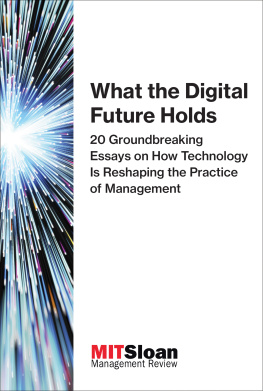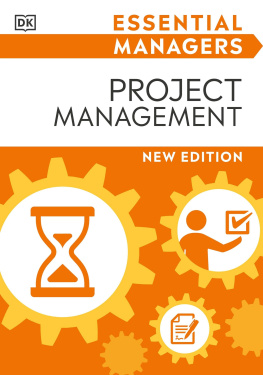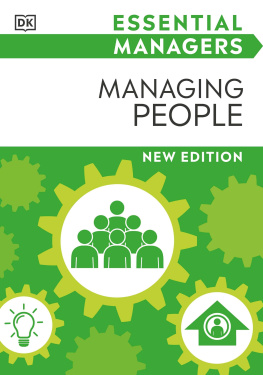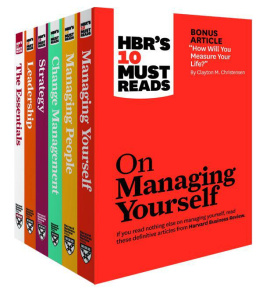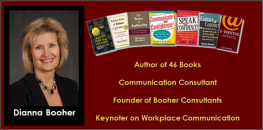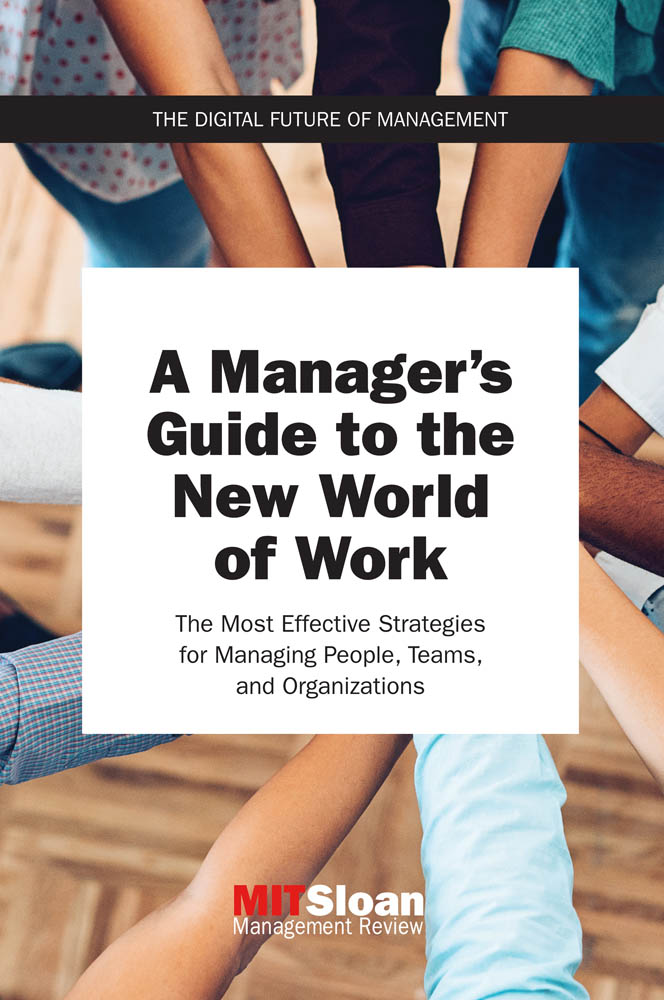
A Managers Guide to the New World of Work
The Digital Future of Management Series from MIT Sloan Management Review
Edited by Paul Michelman
How to Go Digital: Practical Wisdom to Help Drive Your Organizations Digital Transformation
What the Digital Future Holds: 20 Groundbreaking Essays on How Technology Is Reshaping the Practice of Management
When Innovation Moves at Digital Speed: Strategies and Tactics to Provoke, Sustain, and Defend Innovation in Todays Unsettled Markets
Who Wins in a Digital World? Strategies to Make Your Organization Fit for the Future
Why Humans Matter More Than Ever
How AI Is Transforming the Organization
A Managers Guide to the New World of Work: The Most Effective Strategies for Managing People, Teams, and Organizations
A Managers Guide to the New World of Work
The Most Effective Strategies for Managing People, Teams, and Organizations
MIT Sloan Management Review

The MIT Press
Cambridge, Massachusetts
London, England
2020 Massachusetts Institute of Technology
All rights reserved. No part of this book may be reproduced in any form by any electronic or mechanical means (including photocopying, recording, or information storage and retrieval) without permission in writing from the publisher.
Library of Congress Cataloging-in-Publication Data is available.
ISBN: 978-0-262-36058-6
10 9 8 7 6 5 4 3 2 1
d_r0
Contents
David Waller
Adam Waytz
Angela Duckworth
Matthew Bidwell and Federica De Stefano
Reb Rebele
Michael Schrage
Ryan Bonnici
Brian Solis
Chris DeBrusk
Lindred Greer, interviewed by Frieda Klotz
Ken Favaro and Manish Jhunjhunwala
Rob Cross, Thomas H. Davenport, and Peter Gray
Ethan Bernstein, Jesse Shore, and David Lazer
Jeff Schwartz, John Hagel III, Maggie Wooll, and Kelly Monahan
Will Poindexter and Steve Berez
Josh Bersin and Tomas Chamorro-Premuzic
Lynda Gratton
Adam Roseman
Massimo Magni and Likoebe Maruping
David Kiron and Barbara Spindel
Anna A. Tavis
Books in the Digital Future of Management series draw from the print and web pages of MIT Sloan Management Review to deliver expert insights and sharply tuned advice on navigating the unprecedented challenges of the digital world. These books are essential reading for executives from the worlds leading source of ideas on how technology is transforming the practice of management.
Paul Michelman
Editor in chief
MIT Sloan Management Review
Welcome to the new world of work.
In this book, we highlight the smartest new thinking and research on how leaders are navigating the unprecedented challenges of the new digital workplace, an environment in which technologys presence knows no bounds. Youll find stories and insights from companies that are charting new courseswhat theyve tried, whats worked, whats failed, and what theyve learned.
In part I, Managing People, we look at the strategies that organizations use to help employees and managers adapt to a fast-changing world. How do companies help employees step away from always being connected? How do we as individuals embrace the technology that competes for part of our jobs? How do organizations help employees build the skills that will keep them employable?
In this section, we present the following chapters on current challenges and solutions:
- Train Your People to Think in Code. David Waller (Oliver Wyman Labs) argues that organizations need to solve problems with reusable solutions to avoid reengineering the process from the ground upand that the best way to do so is to make code the natural language for sharing analysis across the business.
- Leisure Is Our Killer App. Psychologist Adam Waytz (Kellogg School of Management at Northwestern University) lays out why the capacity to let our minds wander can give humans a surprising edge against advancing technologies in the battle for jobs.
- Self-Reports Spur Self-Reflection. Angela Duckworth (University of Pennsylvania) details how carefully crafted questionnaires asking people to rate themselves can be a tool for self-reflection and self-development, making conversations about character easier to have by laying the foundations of a shared language. Self-awareness, as she notes, is one step toward self-actualization.
- Career Management Isnt Just the Employees Job. (both of the Wharton People Analytics initiative) draw from their teams research into how organizations are helping their people build better careers and argue that analytics can be creatively used for career mapping and for identifying passive internal candidates.
- Can We Really Test People for Potential? Reb Rebele (Wharton People Analytics initiative) explains that people metrics are hard to get rightin part because there can be even more variation within one individuals personality than there is from person to person.
- Does AI-Flavored Feedback Require a Human Touch? Michael Schrage (MIT Initiative on the Digital Economy) notes that direct managerial involvement both complements and competes with data-determined performance reviews.
- What Managers Can Gain from Anonymous Chats. Ryan Bonnici (G2 Crowd) writes that managers who are brave enough to collect anonymous feedback from staff can use that information to help retain great employees, boost productivity, and build greater engagement.
- Are Your Employees Driven to Digital Distraction? Brian Solis (Altimeter) lays out both big-picture strategies (such as rethinking open offices) and individual practices (such as concentrating on a single task for 25 minutes followed by a break of 5 minutes) for maintaining focus in an ever-distracting digital world.
In part II, Managing Teams, we explore the way digital tools affect our work in groups. With so many tools available, both for connecting people and for analyzing the work they do together, what is the right role for a manager? How do managers help teams do their best work?
In this part, we highlight specific approaches and suggestions:
- Get Things Done with Smaller Teams. Chris DeBrusk (Oliver Wyman) describes 10 ways that smaller, more agile teams can achieve greater productivity for the organizationfrom compartmentalizing large, complex problems into separate, achievable pieces that a small team can easily take on and overdeliver, to actively managing away from having indispensable people in change and transformation projects.
- Why Teams Still Need Leaders. In a Q&A, Lindred (Lindy) Greer, associate professor of management and organizations at the University of Michigans Ross School of Business, argues that when people collaborate remotely, good leaders both promote autonomy and use hierarchy to keep teams moving in the same direction.
- Why Teams Should Record Individual Expectations. Ken Favaro (act2) and Manish Jhunjhunwala (Trefis) write about their own experience developing a basic spreadsheet to capture the individual volume, price, and revenue expectations for both sides of a new partnership deal and converting that spreadsheet into an interactive dashboard viewable to investors, directors, top executives, and employees involved in the partnership.
Next page

